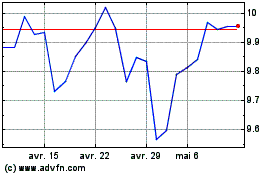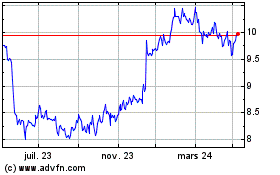Vivendi Is Considering Music IPO -- WSJ
23 Mai 2017 - 9:02AM
Dow Jones News
By Nick Kostov
PARIS -- A resurgent music industry, fueled by the rise of
streaming services, is tempting the parent company of Universal
Music Group to cash in on the music company with an initial public
offering.
In an interview, Vivendi SA Chief Executive Arnaud de
Puyfontaine said the French media conglomerate could float a
minority stake in the music company, departing from the company's
longstanding opposition to selling any part of the California-based
music company.
"This is not a sacred cow," Mr. de Puyfontaine said, adding the
firm has no imminent plans to carry out the IPO.
Vivendi's flirtation with a Universal IPO shows how the music
industry has begun to turn the corner on nearly two decades of
decline. Record labels that once suffered steep losses on CD and
unit sales are now growing again as Spotify and other services pay
license fees for the rights to stream songs from their
libraries.
"I remember the people a few years ago who explained to us that
music was a dying business and would never recover," Mr. de
Puyfontaine said. "I have a good memory, and facts are proving them
wrong."
Universal Music has been a bright spot for Vivendi as
subscription-based streaming has emerged as a possible business
model for the music industry, with growth outpacing declines in
physical music sales and digital downloads. Universal Music and its
rivals -- Warner Music Group Corp and Sony Corp.'s Sony Music
Entertainment -- rake in royalty payments whenever listeners access
their songs through the streaming services.
In 2016, the industry's global revenue from recorded music grew
6% to $15.7 billion, the single largest year-over-year gain since
the International Federation of the Phonographic Industry started
tracking the market in 1997. The rise owed largely to a 60%
increase in streaming revenue, which now amounts to $3.9
billion.
While label executives are relieved to see industry revenues
rise they also recognize that a single year of robust growth is
hardly a guarantee that their fortunes have reversed.
Among other issues, neither Spotify nor its rivals has ever
reported a profit. To change that, those services may need to lower
the royalty rates they pay music companies like Universal.
The nascent recovery "does not erase 15 years of declines, or
continuing uncertainty about the future," Cary Sherman, CEO of the
music industry's U.S. trade group, wrote in a blog post earlier
this year.
Mr. de Puyfontaine, however, said that Vivendi's stock may be
undervalued in part because it doesn't reflect the true value of
the music unit. Some investment banks pitching the idea of a float
value the unit at up to EUR20 billion, Vivendi General Counsel
Frederic Crepin told shareholders last month. Analysts value the
unit at closer to EUR13 billion.
Vivendi has undergone a deep transformation in the past three
years but Mr. de Puyfontaine and Vincent Bolloré, Vivendi's
chairman and main shareholder, have yet to convince investors that
the company has promising growth prospects. Two years ago, Vivendi
ignored calls from an activist shareholder to unlock value by
selling some or all Universal..
Investors also say that floating a stake in Universal Music
Group could complicate Vivendi's attempts to find synergies between
its music, film and television and videogame assets. It could
become a distraction, adding a regulatory burden and increasing the
time that Lucian Grainge, Universal Music Group's CEO, would have
to spend on Wall Street investors. Mr. Bolloré met with Mr. Grainge
in California last week but didn't discuss a possible IPO,
according to people familiar with the matter.
A Universal spokesman declined to comment.
"It can make some sense to increase the value of its shares, but
it makes no sense in terms of its global strategy," said an analyst
for one of Vivendi's top investors. "It would be something just to
tell the analysts : 'Look, my share price is undervalued.'"
Vivendi's shares have risen about 3.7% since Mr. Bolloré became
chairman three years ago, and investors and bankers say they are
still skeptical about how Vivendi's strategy to build a media giant
focused on Southern Europe will pan out. By comparison, France's
blue chip index is up 18% over the period and the index tracking
European media stocks has gained 15%. That's despite Vivendi giving
back EUR8 billion in cash to shareholders through special dividends
and share buybacks.
But Mr. de Puyfontaine is unfazed. He stressed that Vivendi has
an edge on competition because of its combination of owning
content, building partnerships with telecom companies to distribute
that content, and having data on how its customers consume that
content.
"We are proving day after day that our businesses are working
together, and that they are creating much greater value for Vivendi
than the sum of our parts," Mr. de Puyfontaine said.
Ethan Smith contributed to this article in Los Angeles.
Write to Nick Kostov at Nick.Kostov@wsj.com
(END) Dow Jones Newswires
May 23, 2017 02:47 ET (06:47 GMT)
Copyright (c) 2017 Dow Jones & Company, Inc.
Vivendi (EU:VIV)
Graphique Historique de l'Action
De Mar 2024 à Avr 2024

Vivendi (EU:VIV)
Graphique Historique de l'Action
De Avr 2023 à Avr 2024
